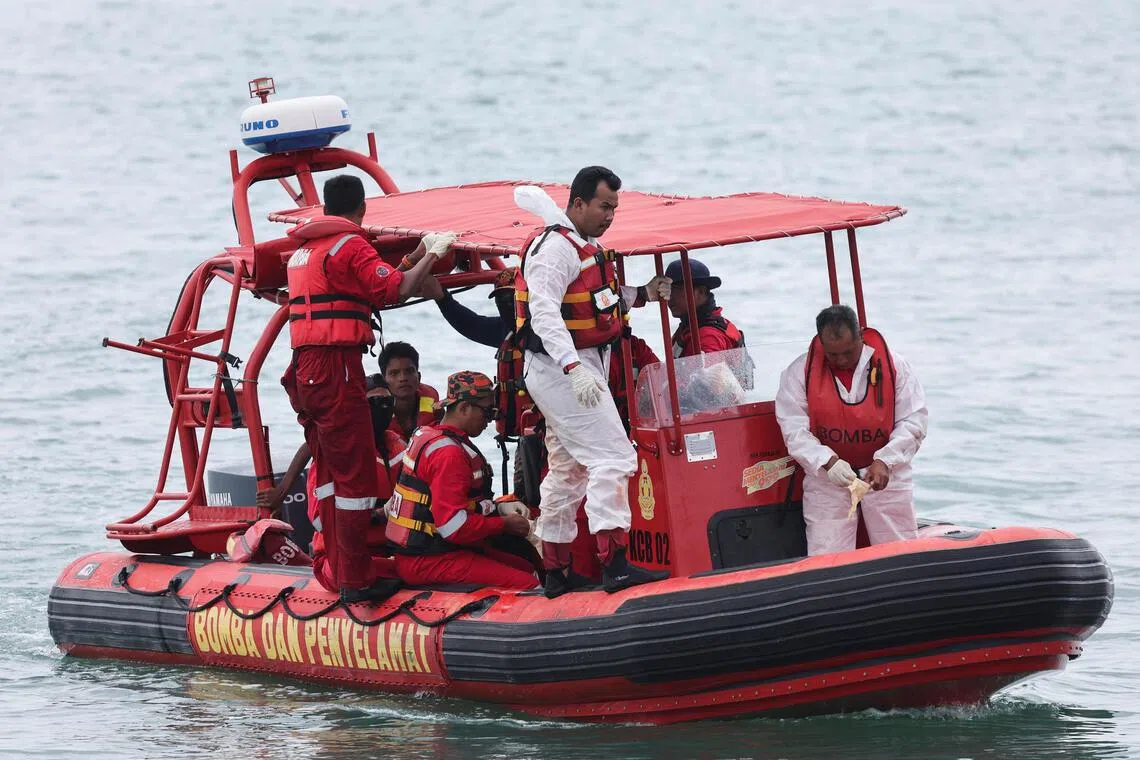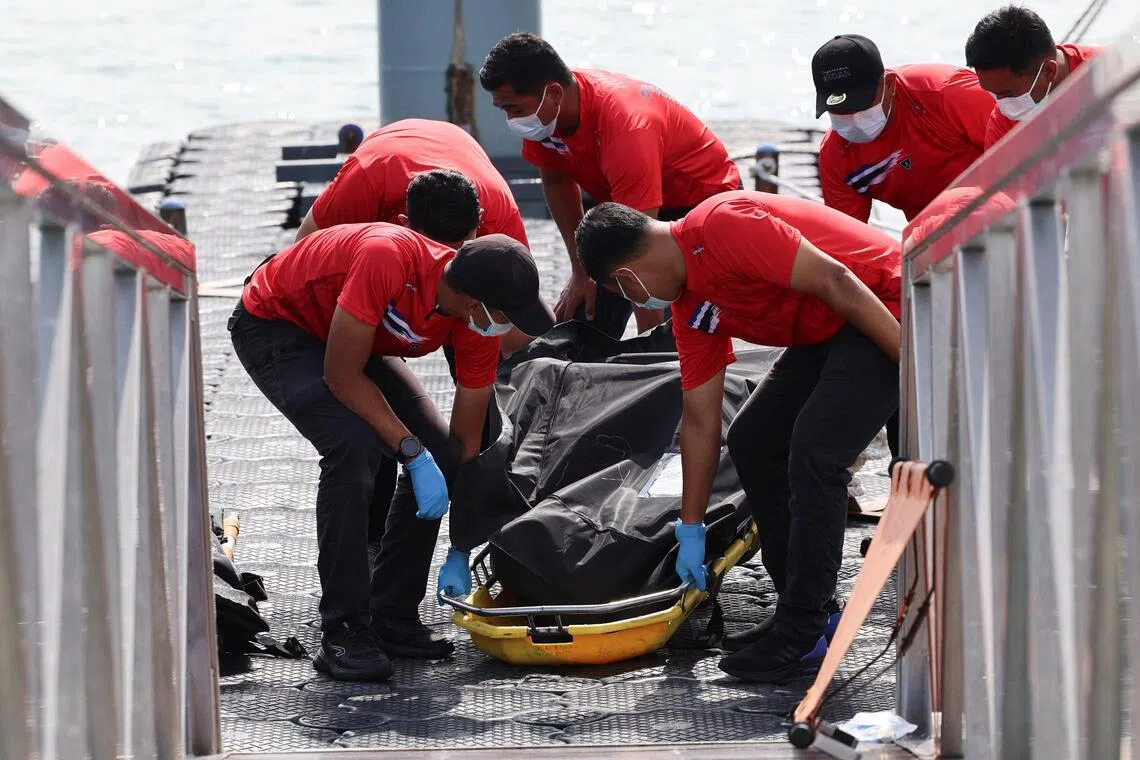Rohingya deaths off Malaysia’s Langkawi raise fears of renewed perilous journeys across Andaman Sea
Sign up now: Get insights on the biggest stories in Malaysia

Rescuers carrying survivors from a vessel of refugees believed to be from Myanmar, which overturned in rough seas, in Langkawi on Nov 11.
PHOTO: REUTERS
- Boat tragedy off Langkawi claims 27 lives, highlighting a potential surge in dangerous Rohingya crossings due to conflict and aid cuts in Myanmar and Bangladesh.
- Unusual movement patterns are noted, with at least 16 boats leaving since September, prompting warnings of more casualties due to unseaworthy vessels and pushbacks by coastal states.
- Malaysia investigates trafficking links, while advocates urge Asean and UNHCR to create humanitarian corridors. Resettlement options are narrowing globally, exacerbating Rohingya desperation.
AI generated
KUALA LUMPUR – The deaths of 28 refugees off Malaysia’s Langkawi Island on Nov 7 have raised fears of renewed Rohingya voyages across the dangerous Andaman Sea, as conflict and aid cuts push more families to flee.
Malaysian officials say 217 Rohingya and other Myanmar nationals have already reached Langkawi this year, a sharp shift after minimal landings over the last two years.
Home Minister Saifuddin Nasution Ismail, who visited Langkawi on Nov 12, said the island remains a popular landing destination for refugees, and the tragedy highlighted how humanitarian conditions have sharply worsened.
“In 2023, only 11 landings were recorded,” he noted.
The vessel carrying dozens of refugees, believed to be from Myanmar, overturned in rough seas
While the authorities continue their search
Ms Chris Lewa, director of the Arakan Project, a human rights organisation that has been monitoring Rohingya journeys across the region, said at least 16 boats have left since September. Thirteen were launched from Bangladesh and three from Myanmar, well before the typical sailing season that runs from late October to late April. She warned that it was only just the beginning.
“It is highly unusual to record so many departures this early,” she told The Straits Times.
Ms Lewa said worsening weather and pushbacks by coastal states could lead to more casualties.
“These vessels are unseaworthy, and without regional coordination, tragedies like Langkawi will keep happening,” she said.
Life on land offers little reprieve. In Myanmar’s Rakhine State, fighting between the Arakan Army and junta forces has intensified, displacing thousands and cutting communities off from aid.
A UN report released on Sept 26 found the region “nowhere near ready” for safe returns, citing air strikes, blockades and forced conscription.
Across the border in Bangladesh, where more than a million Rohingya take shelter in sprawling camps, shortages of food, medicines and other supplies are deepening.
The UN will cut food rations to Rohingya refugees
Rights groups said these pressures make the dangerous journeys across the seas almost inevitable.
Mr Nur Sadek, executive director of the Rohingya Rights Response and a refugee himself, said the incident showed how few options the Rohingya have.
“People take these journeys because they see no other way out,” he said.
“Conditions in the camps must improve, and refugees need more freedom of movement.”
He urged governments in the region to work with the UN High Commissioner for Refugees and Asean to open humanitarian corridors and legal pathways so people “do not turn to the sea out of desperation”.

Police officers carrying the body of a victim after a boat carrying members of Myanmar’s persecuted Rohingya community sank, in Langkawi on Nov 10.
PHOTO: REUTERS
Ms Lilianne Fan, co-founder of the Malaysian Advisory Group on Myanmar, said the Langkawi tragedy was a reminder that the crisis in Rakhine “is far from over”.
She said Asean should strengthen cooperation to ensure humane, coordinated responses, including safe disembarkation procedures, national refugee protection systems and respect for non-refoulement, which is an international legal principle that prohibits states from returning any person to a country where they would face serious danger.
Meanwhile, on the ground, Malaysia is also focusing its efforts domestically, investigating whether traffickers arranged or profited from the voyage.
“Organised crime can involve only one or two people pursuing profit,” Datuk Seri Saifuddin said in Langkawi.
“We are looking into whether this case involved human trafficking or migrant smuggling.”
Malaysia remains a preferred destination for displaced Myanmar nationals, due in part to its Muslim-majority population and established Rohingya networks. UNHCR data shows that Malaysia hosts about 200,000 registered refugees and asylum seekers as at May 2025, nearly 180,000 of them from Myanmar.
Malaysia is not a signatory to the 1951 Refugee Convention and does not formally recognise refugees. While it hosts one of the largest refugee populations in South-east Asia, those registered with UNHCR are treated as undocumented migrants and face restrictions on work, education and healthcare.
Ms Lewa said Malaysia’s approach has gradually shifted from sheltering refugees to deterring them.
“For years, Malaysia allowed refugees to stay until resettlement,” she said.
“But in recent years, the approach has hardened to prevent entry, especially by sea, and to detain those who reach shore.”
The mostly Muslim Rohingya have been persecuted in Myanmar for decades, with many escaping the 2017 military clampdown that has sent more than a million fleeing into neighbouring Bangladesh.
These regional challenges are unfolding amid a global backdrop where resettlement options are narrowing even as displacement reaches record levels.
News reports highlighted that several countries have tightened asylum systems and reduced refugee quotas in response to domestic political pressures.
In Europe, Germany temporarily halted its UN resettlement programme in early 2025 amid internal policy debates over migration management.
In the US, the new administration has sharply lowered the refugee resettlement ceiling
Rights groups say the change marks one of the most restrictive US stances in decades and comes as the world faces growing displacement crises from Myanmar to the Middle East.
For now, Mr Saifuddin said the Malaysian government remains focused on rescuing survivors and prosecuting syndicates linked to the Langkawi case.
“An investigation is under way to identify and take firm action against those responsible for organising this dangerous and illegal voyage. Those exploiting vulnerable people for profit will be held fully accountable,” he said.
Sign up for our weekly
Asian Insider Malaysia Edition
newsletter to make sense of the big stories in Malaysia.



